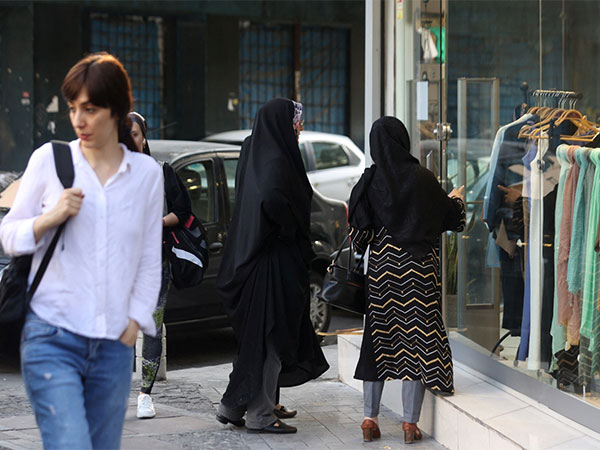

Iran’s government are sending women for counselling in an effort to enforce regulations requiring them to cover their hair. Healthcare organisations have warned that the country’s judiciary is appropriating mental medicine for its own ends, but others have cited the action as evidence that the government is unable to uphold hijab rules, France 24 reported.
In a symbolic act of defiance, Iranian actress Afsaneh Bayegan has repeatedly posted photos of her unveiled hair on Instagram and recently attended a public ceremony without a hijab.
The action infuriated the Iranian government, which has been searching for fresh means to compel women to cover their hair. According to the country’s Fars News Agency, Bayegan, 61, was handed a two-year suspended prison sentence and told to go to a “psychological centre” once a week to “treat her anti-family personality disorder.”
A few days earlier, a court in Tehran province sentenced a woman to spend a month cleaning corpses in a morgue after she was caught driving without a hijab.
Many Iranian women have chosen to start showing their hair since the death of Mahsa Amini in September 2022 after being detained by Iran’s morality police for “improperly” wearing her headscarf. Iranian celebrities, athletes and actresses have followed suit in solidarity.
“The sentence that [Bayegan] was given sets an example,” explains Azadeh Kian, an Iran specialist and professor of political science at Université Paris Cité. Bayegan was one of Iran’s first cinema stars after the Islamic Revolution in 1979 and is a respected figure on Iranian television,” France 24 reported.
Bayegan’s case is not an isolated one. Iranian judges recently “diagnosed” Iranian actress Azadeh Samadi with an “antisocial personality disorder” after she wore a hat instead of a hijab at a funeral. Samadi will also have to seek therapy weekly in a “psychological centre”.
At the start of July, a Tehran court sentenced a woman to two months in prison and six months of psychological treatment for “a contagious psychological disorder that leads to sexual promiscuity” because she didn’t wear a hijab.
The surge in sentences forcing women to undergo psychological treatment has alarmed the Iranian psychiatric sector. In an open letter sent to the head of the country’s judiciary, Gholam-Hossein Mohseni Ejei, on July 23, the presidents of four mental health organisations accused authorities of “exploiting psychiatry” for other purposes.
“Diagnosing mental health disorders is the responsibility of psychiatrists, not judges,” they decried, according to France 24.
Their concerns are all the more serious given that even young children are not being spared. At the peak of the anti-government protests that broke out in Iran following Mahsa Amini’s death, Education Minister Youssef Nouri admitted that schoolchildren were being detained in the streets or at school and held in “medical psychological centres” where they were “re-educated” to prevent “anti-social” behaviour.
Kian said this misuse of psychiatric treatments is “first and foremost, a demonstration of the disarray of the authorities”. Despite government efforts to raise the pressure on anti-hijab protesters, more and more women have been abandoning their headscarves in recent months.
Authorities have been handing out hefty fines, sending text messages if women are spotted driving without a hijab, confiscating vehicles and even pressuring employers – including those in the private sector – to get women fired. Unveiled women have even been refused hospital treatment while shops catering to them have been forced to shut down, France 24 reported.
In July, the authorities temporarily closed the offices of the Iranian equivalent of Amazon, Digikala, after a photo was posted on social media showing employees at the retail giant’s headquarters without headscarves.
The authorities “have tried everything [to stop women from disobeying the hijab law] and it hasn’t worked”, Kian says. “They are becoming increasingly weakened, forced to take measures like psychological treatment.”
For Farhad Khosrokhavar, the director of studies at the Paris-based School of Advanced Studies in the Social Sciences, the trend is yet another example of the “rift between the Iranian authorities and Iranian society, especially its youth”.
“At the uppermost echelons of the authorities, who are mostly men in their eighties, power comes with certain preconceptions and arbitrary notions,” he said.
“They are trying to impose standards that are totally disembodied and no longer have any legitimacy in the eyes of Iran’s youth. They are further discrediting themselves within Iranian society and losing legitimacy,” he added.
But the effort to clamp down on anti-hijab protesters is not likely to slow anytime soon. Various branches of the Iranian state seem to be taking part in a game of “one-upmanship” to stifle any act of defiance, Kian observes.
A bill presented to the Iranian parliament at the end of July proposed even harsher penalties for women who refuse to wear a headscarf, France 24 reported.
“If this law is passed, women could lose their civil rights, their right to work. They would be deprived of everything,” Kian said.
Most importantly, the Bill introduces a new crime that has sparked concern among legal experts, namely that of “promoting being unveiled”.
“It would mean that, for repeated offences, unveiled women could be accused of ‘disseminating ideas against the hijab’ – in which case they could even be sentenced to death,” Kian warned.